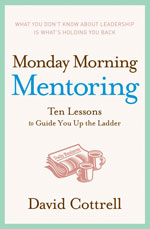 Last week we discussed the importance of not making excuses. Everyone has issues, and everyone can find numerous excuses not to prosper. But we need to understand that excuses never improve any situation. We’ve all found ourselves making excuses at some point in our lives.
Last week we discussed the importance of not making excuses. Everyone has issues, and everyone can find numerous excuses not to prosper. But we need to understand that excuses never improve any situation. We’ve all found ourselves making excuses at some point in our lives.
You have a myriad of choices in life, so you’re certainly entitled to choose finding excuses for yourself and blaming other people. Or, you can show your willingness to change by eliminating the excuse-making habit. It takes time and effort to change a habit, but the end result will be worth it. The solution lies entirely within your own control. You are the only one who can turn things around and achieve the goals you set. Stop blaming and start doing.
Here are three ways to eliminate the excuses that are holding you back:
1. Find the root cause of your excuses.
Excuses are an avoidance tactic. Sometimes we come up with ways to explain away our limitations. Usually, the excuse you’re using is never the real reason why you “can’t” accomplish something. Acknowledge the excuse by asking yourself, “What concerns me most about doing this and why?” Your answer to this question will help you understand what is preventing you from taking action.
Your negative belief system may be at the root of your excuses. For example, imagine you were using Altrus in a specific procedure but did not achieve the desired outcome. You might then create a negative belief system which says that Altrus is not applicable for those types of procedures. If you announce this new negative belief system to colleagues, eventually you’ll find someone who will reinforce this belief with his or her own negative experiences. And, before you know it, you’ll stop promoting Altrus for those specific procedures because of your excuse (stemming from fear) that Altrus doesn’t work in those situations. Yet, in another part of the country, there is a salesperson experiencing great success with Altrus in that particular type of procedure!
Here’s the thing: negative belief systems are merely learned, and they can be substituted with a new positive belief system. To do this, we must question the validity of the negative belief system by asking ourselves honest questions. In the Altrus example: “Have I ever had success with Altrus before? Has anyone I know ever had success with Altrus in this type of procedure? What would I need to do to have that level of success?”
By asking good questions, we force ourselves to come up with positive counterstatements to back up a positive belief system. To reinforce your new positive belief system, you may need to use education to go beyond the excuse.
2. Mind the company you keep and avoid other excuse makers.
Have you ever wondered why birds of a feather flock together? Eagles fly with eagles, and turkeys…well, they don’t fly well at all…hang with other turkeys. Renowned business philosopher Jim Rohn researched the “Law of Associations,” which suggests we are all a direct reflection of the five people we associate with the most. The way we walk, talk, think, dress, make money, manage our health, accomplish goals, and develop values will mirror those five people. If the five people you most closely affiliate with have negative philosophies, it’s unlikely you will have a positive one.
Are your relationships with close colleagues permeated by themes of blame and disempowerment—or do they project themes of responsibility, self-reflection, and empowerment?
If the five people you are around the most constantly complain, blame others, make excuses, and act in a negative manner, what is the likelihood you will stay on the upward swing of success? You already know the answer—not a high likelihood at all.
My point is this: we need to be acutely aware of the company we keep. Observe those you “flock with”—where are they headed? Where do you want to be headed? Are the people around you more successful than you? Are they people you aspire to be, with the kind of life you want? Are they living on the upward or downward swing of success? Maybe it’s time to reevaluate the company you keep.
3. Live with a “no excuses” attitude.
As an author who writes about overcoming fear, Susan Jeffers says, “Feel the fear…and do it anyway.” Recognize the excuses you’re making, own up to them, and do what you want to do, regardless of what you think is holding you back. Yes, it’s a lot easier said than done, but it’s one thing to say you have control of your life and another to actually take control. Building these habits is difficult—sometimes painful in the moment—but, afterward, you will feel refreshed and indescribably proud of yourself.
Sure, external circumstances might have put you at a disadvantage. But you have the choice to either succumb to circumstances or rise above them. To stop making excuses, you have to forget about the cards you’ve been dealt in life and make the most of what you do have. You can complain about a terrible hand, or you can do something about it. You are the only one who can improve yourself. No one else is going to do it for you.
What excuses have you been making?
What choices will you make this week to stop making excuses and start acting?
Remember—we aren’t perfect, and we do make mistakes. But nothing is ever accomplished through excuses.

















